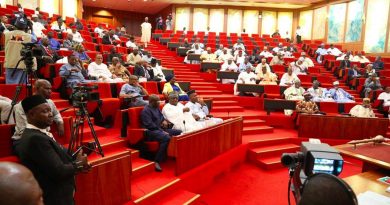Meristem warns rice, verg oil prices to surge due to India export ban; global inflation risk from Saudi Arabia, Russia oil cuts
Meristem, a prominent Nigerian asset management, stockbroking, and financial advisory firm, has warned that Nigerians should expect the price of rice, vegetable oil, and other commodities that are import-dependent to rise much further this month as a result of a partial ban on rice exports in India.
It also added that higher logistic costs, poor road networks, global energy, and premium motor spirit (PMS) pump prices are other factors that will contribute to this imminent rise.
It made this prediction in its recent “Macroeconomic Update: Inflation Expectation” report warning as well that Saudi Arabia and Russia’s reduced crude oil production which is expected to drive oil prices higher could worsen global inflation.
It read: “We anticipate a continued surge in the price of rice and oils, hinged on the partial ban on rice exports in India, which has had a substantial impact on global rice supply.
“We also expect that higher logistic costs and poor road networks in the country would further impact food prices. Thus, we expect food inflation to shoot up by 173 bps to 28.71% for August 2023.
“Additionally, the headline index is expected to experience an uptick due to higher global energy and premium motor spirit (PMS) pump prices.”
The prominent Nigerian asset management and financial advisory company had warned that “the lingering challenges in sourcing foreign exchange (FX) and depreciating exchange rates are also expected to drive up the prices of import-dependent items like petroleum products, motor vehicles, clothing and fabrics, etc., that typically impact the core index movement.
“Overall, we expect headline inflation to increase by 129bps to 25.37% (vs. 24.08% YoY in July 2023).”
On Thursday, the country’s foreign exchange crisis worsened following information that the naira traded at N945 to a dollar in the parallel market. This is most likely to give credence to the Meristem prediction for this month, especially as rice importation is not among the items that can get dollars from the Central Bank of Nigeria.
And on the cut back of crude oil from Saudi Arabia and Russia, the report said, “Looking ahead, we anticipate the voluntary extension of oil production cuts by Saudi Arabia and Russia to lead oil prices further upward, posing a significant upside risk to global inflation.
“The duo countries announced their intention to extend their oil supply cuts (1.00 mbpd for Saudi Arabia and 0.3 mbpd for Russia) throughout the remainder of 2023, leading to an upsurge in Brent crude price to USD90.49/bbl as of September 7—the highest level since November 2022.”
The price of crude oil has surged over 2 percent this month. Brent crude, which stood at $85.24 per barrel on August 30, 2023, has now risen to $90.50 per barrel. West Texas Intermediate (WTI) also climbed from $81.63 per barrel on August 30, 2023, to $89.13 per barrel, according to data from the oilprice.com website.
This decision to prolong the oil production cuts was reached on Tuesday, September 5, by these two major oil producers. They remain steadfast in this decision, despite pleas from the U.S. and their Western allies to avert these production cuts.
“The Saudis previewed such an outcome last month with their longer, deeper statement, but today’s move still managed to catch many market participants by surprise. Once again proves that Prince Abdulaziz remains firmly in whatever-it-takes mode,” said RBC Capital Markets analyst Helima Croft, referring to Saudi Energy Minister Prince Abdulaziz bin Salman when he spoke to Reuters.
Saudi Arabia is set to prolong its 1 million barrels per day (bpd) oil output reduction voluntarily until December 2023, according to a statement from the state news agency SPA, citing an energy ministry official.
In a similar vein, Russia will also extend its voluntary cut of 300,000 bpd in oil exports until the year-end, as announced by Deputy Prime Minister Alexander Novak.
Both nations plan to assess these cuts monthly, with the option to deepen them or adjust output levels based on market conditions, as reported by SPA and Novak.




